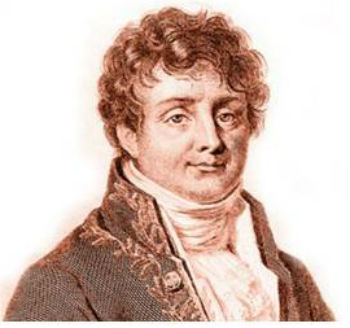|
CULTURA DA QUÍMICA
Joseph Fourier : mathematician, physicist and egyptologist. Joseph Fourier, in full Jean-Baptiste-Joseph, Baron Fourier, (born March 21, 1768, Auxerre, France—died May 16, 1830, Paris), French mathematician, known also as an Egyptologist and administrator, who exerted strong influence on mathematical physics through his Théorie analytique de la chaleur (1822; The Analytical Theory of Heat). He showed how the conduction of heat in solid bodies may be analyzed in terms of infinite mathematical series now called by his name, the Fourier series. Far transcending the particular subject of heat conduction, his work stimulated research in mathematical physics, which has since been often identified with the solution of boundary-value problems, encompassing many natural occurrences such as sunspots, tides, and the weather. His work also had a great influence on the theory of functions of a real variable, one of the main branches of modern mathematics.  Joseph Fourier Créditos: TheFamousPeople
In 1798, with Monge and others, Fourier accompanied Napoleon on his expedition to Egypt. Until 1801 he was engaged in extensive research on Egyptian antiquities, gave advice on engineering and diplomatic undertakings, and served for three years as the secretary of the Institut d’Égypte, which Napoleon established in Cairo in 1798. After his return to France, Fourier was charged with the publication of the enormous mass of Egyptian materials. This became the Description de l’Égypte, to which he also wrote a lengthy historical preface on the ancient civilization of Egypt. He was also appointed prefect (administrator for the national government and département) of the Isère département, a position he held from 1802 to 1814, with his headquarters at Grenoble. He showed great administrative ability, as in directing the drainage of swamps, while continuing his Egyptological and mathematical work. In 1809 Napoleon made him a baron. Following Napoleon’s fall from power in 1815, Fourier was appointed director of the Statistical Bureau of the Seine, allowing him a period of quiet academic life in Paris. In 1817 he was elected to the Académie des Sciences, of which, in 1822, he became perpetual secretary. Because of his work in Egyptology he was elected in 1826 to the Académie Française and the Académie de Médecine. Fourier began his work on the Théorie analytique de la chaleur in Grenoble in 1807 and completed it in Paris in 1822. His work enabled him to express the conduction of heat in two-dimensional objects (i.e., very thin sheets of material) in terms of the differential equation. Such Fourier series, already occasionally used by Leonhard Euler and other 18th-century mathematicians, but somewhat distrusted, received through Fourier their important position in modern mathematics. He also extended this concept into the so-called Fourier integral. Doubts of the validity of the Fourier series, which led later mathematicians to a fundamental renewal of the concept of real function, were resolved by P.G.L. Dirichlet, Bernhard Riemann, Henri Lebesgue, and others. Fourier worked on the theory almost his entire life. He was also interested in the determination of roots of algebraic equations (the so-called theorem of Fourier). Text by Dirk Jan Struik. EB. Posted: May 16, 2018. Nota do Managing Editor : A ilustração não consta do original e foi introduzida pela Editoria do Boletim.
|
||||||||||||||||||||||||
